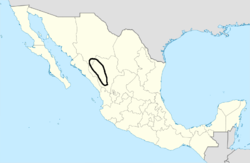Tepehuán Revolt
| Tepehuán Revolt | |||||||
|---|---|---|---|---|---|---|---|
| Part of the Mexican Indian Wars, List of conflicts in North America, and List of wars involving Mexico | |||||||
 In 1616, the Tepehuán Indians lived primarily in the state of Durango on the eastern slopes of the Sierra Madre Occidental |
|||||||
|
|||||||
| Belligerents | |||||||
|
Spaniards Basque African Indian Allies |
Tepehuánes |
||||||
| Commanders and leaders | |||||||
|
Captains: Diego Martinez de HurdaideBartolome Juarez Ontiveros Castañeda Aguirre Montaño Mosquero |
War Chiefs: Francisco GogoxitoMateo Canelas Don Marcos Don Pedro de Mezquital Don Juan Atotonilco Juan Marcos de Milpillas |
||||||
The Tepehuán Revolt broke out in Mexico in 1616. The Tepehuán Indians attempted to break free from Spanish rule. The revolt was crushed by 1620 after a large loss of life on both sides.
Tepehuánes
Tepehuán Allies:
Captains:
War Chiefs:
The Tepehuán Indians lived on the rugged eastern slopes and valleys of the Sierra Madre Occidental, primarily in the future state of Durango. They spoke a Uto-Aztecan language and depended mostly on agriculture for their livelihood. Thus, they differed from their neighbors in the deserts to the east, the Chichimeca who were nomadic and semi-nomadic hunter-gatherers.
The Tepehuán, Acaxee, and Xixime to their west shared common traits such as
“the cultivation of corn, beans, squash, chiles, and cotton adjacent to dispersed, small villages and settlements;…frequent warfare with associated ritual cannibalism; polytheism and worship of idols; the presence of shamans or ritual specialists (hechiceros); and a decentralized political structure that relied on the leadership of elders in peacetime and on war leaders to deal with outsiders.”
The Tepehuán suffered a series of devastating epidemics of European-introduced diseases in the years before the revolt. Epidemics were known to have occurred in their region in 1594, 1601-1602, 1606-1607, 1610, and 1616-1617. The Tepehuán and their neighbors may have been reduced in population by more than 80 percent by the epidemics, from a pre-Columbian population of more than 100,000 to fewer than 20,000, of which the Tepehuán may have been one-half of this total
During the Chichimeca war (1550–1590) the Tepehuán remained neutral although urged by the Chichimecas to join them in resistance to Spanish expansion. The Spanish failed to defeat the Chichimeca militarily and instituted a new policy called "peace by purchase" in which Catholic missionaries would be a major tool in pacifying hostile and semi-hostile Indians. Indians were to be supplied with food and tools and resettled into towns. Missionaries, rather than the military, would take on most of the responsibility for integrating the Indians into Mexican and Christian society. The Acaxee and Xixime were the first to have this new Spanish policy applied to them and the Tepehuán would be next.
...
Wikipedia
